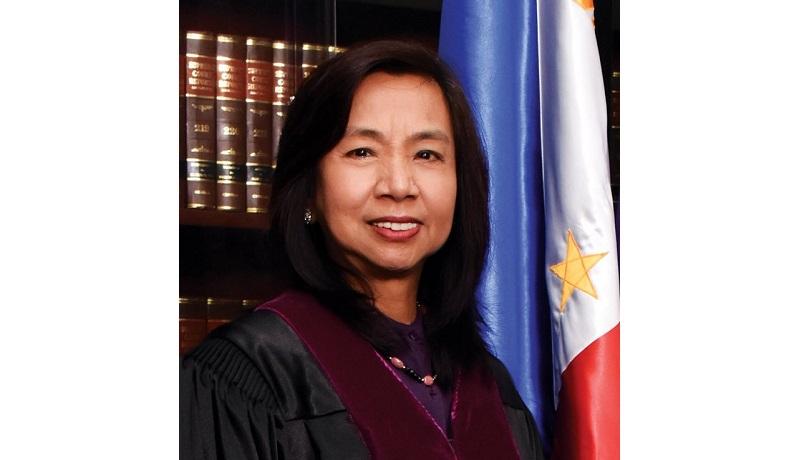CJ applicant Bernabe agrees with Ombudsman: SALNs can be weaponized vs justices

Supreme Court (SC) Senior Associate Justice Estela Perlas Bernabe said Friday she agrees with the position of Ombudsman Samuel Martires that asset statements could be weaponized against government officials.
Bernabe, who aspires to become the next chief justice, told the Judicial and Bar Council (JBC) that releasing a summary of the justice’s Statement of Assets, Liabilities, and Net Worth (SALN) would be enough to promote transparency.
“I have really nothing to hide. It’s just that sometimes people tend to criticize or to find ways and means to really destroy the reputation of a justice,” she said when asked by JBC member and retired SC justice Noel Tijam whether she was in favor of publishing the SALNs of the justices provided it conforms to the requirements of the data privacy law.
“If there are complaints against the justice, then I think the complainant should really file a case in the proper forum.”
Asked if she supports Martires’ view that SALNs could be used against public officials, Bernabe said, “To a certain extent, yes, Your Honor.”
“A justice is a person of integrity, competence. He has all the qualifications of a justice but it might come to a point where the SALN can be used to destroy this certain person,” she said.
Associate Justice Alexander Gesmundo, another applicant for chief justice, said a person who wants a copy of the justices’ SALN should have a legitimate purpose.
“At the moment, there is an existing administrative issuance of the Court [governing] the release of SALN. Transparency is the rule, Your Honor, and I don’t think there should be any objection on that aspect,” he said.
“They can possibly get the entire copy of the SALN but they have to consider also, as we have said in our circular, the purpose must be legitimate.”
Gesmundo said SC justices faced risks while doing their duties.
Martires tightened the rules on the release of SALNs last September by requiring the requester to secure the consent of the declarant or the public official who owns the SALN.
For its part, the SC said in 2012 that access to official records, such as SALNs of the justices, is not prohibited but must be regulated. However, there were instances that the Court denied requests for copies of the justices’ SALNs for "lack of reasonable and sufficient basis."
In a ruling last January, the SC declared that an asset statement of a government official or employee should be viewed as a “tool for public transparency” and not as a “weapon for political vendetta.”
“For the future's worth, it is herein stressed that the SALN is a tool for public transparency, never a weapon for political vendetta,” the SC said.
“The Filipino people live, toil, and thrive in a democracy, but the rule of law should not stand parallel to the rule of the mob. Toe this line, and the nation may eventually behold the laws that the courts have forever sworn to uphold battered and bent.”
The high court issued the statement after it granted the plea of the widow of the late Chief Justice Renato Corona for the release of his retirement benefits and her survivorship pension, nearly nine years after Corona was ousted by the Senate due to his failure to fully disclose his wealth.
The appointment of Corona’s replacement, Maria Lourdes Sereno, was voided by the SC in 2018 due to SALN issues.
During the interview, Bernabe also faced questions about her plans for the judiciary, health, the election protest involving Vice President Leni Robredo and former senator Ferdinand “Bongbong” Marcos Jr., the 1987 Constitution’s 24-month deadline for SC to resolve cases.
She said her plans include computerization of basic court processes, creation of rules to further decongest court dockets, tap a pool of lawyers to assist SC justices in the resolution of cases, and form an advisory council composed of the five most senior justices to ensure continuity of the plans and programs, among others.
Calling herself a textualist, Bernabe said she decides on cases “in accordance with the law and the intent of the framers.”
“When the law is clear and the intent is clear, I interpret the law in accordance with the law and the intent of the framers,” she said.
“When the law is vague and the intent could not be determined from the framers then I would apply reason, logic, the societal implications of the ruling and fairness most of all of the court’s ruling.”
Bernabe, who has been with the SC since 2011, said she’s healthy enough to lead the judiciary.
“I am very, very healthy and I am fit to be promoted to the position of chief justice,” the 68-year-old magistrate said. “My medical certificates could attest to that.”
This is Bernabe’s second time to apply for the highest post in the judiciary. She lost to incumbent Chief Justice Diosdado Peralta in 2019.
Peralta will leave the judiciary on his 69th birthday on March 27, one year ahead of the mandatory retirement age for judges and justices. Bernabe is scheduled to retire in May 2022.—AOL, GMA News

Need a wellness break? Sign up for The Boost!
Stay up-to-date with the latest health and wellness reads.
Please enter a valid email address
Your email is safe with us





